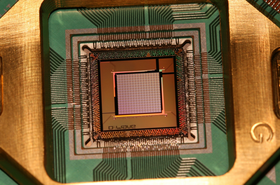Google claims to have reached quantum supremacy, where a quantum computer can carry out calculations that classical computers practically cannot.
In a research paper accidentally posted on a NASA website, and spotted by the Financial Times before it was removed, Google announced the major computing milestone - but noted that the system can only perform a single, highly technical calculation, and use for practical applications was still years away.
Supreme
In three minutes and twenty seconds, Google's quantum computer proved that a random-number generator was truly random. The same calculation would take approximately 10,000 years on the world's most powerful supercomputer, Summit, Google claimed.
“This dramatic speed-up relative to all known classical algorithms provides an experimental realization of quantum supremacy on a computational task and heralds the advent of a much-anticipated computing paradigm,” the paper said.
“To our knowledge, this experiment marks the first computation that can only be performed on a quantum processor.”
The researchers predicted that the power of quantum systems will expand at a “double exponential rate,” compared to the exponential rate of Moore’s Law.
Google originally expected to reach quantum supremacy by the end of 2017 with a 72 qubit system. But it was too difficult to control, and the team built a 53 qubit system codenamed Sycamore that was able to reach quantum supremacy.
“Google’s recent update on the achievement of quantum supremacy is a notable mile marker as we continue to advance the potential of quantum computing," Jim Clarke, director of quantum hardware at Intel Labs, said in a statement.
"Achieving a commercially viable quantum computer will require advancements across a number of pillars of the technology stack."
Last week, rival IBM said that it would make its own 53 qubit system available on the cloud this October.




